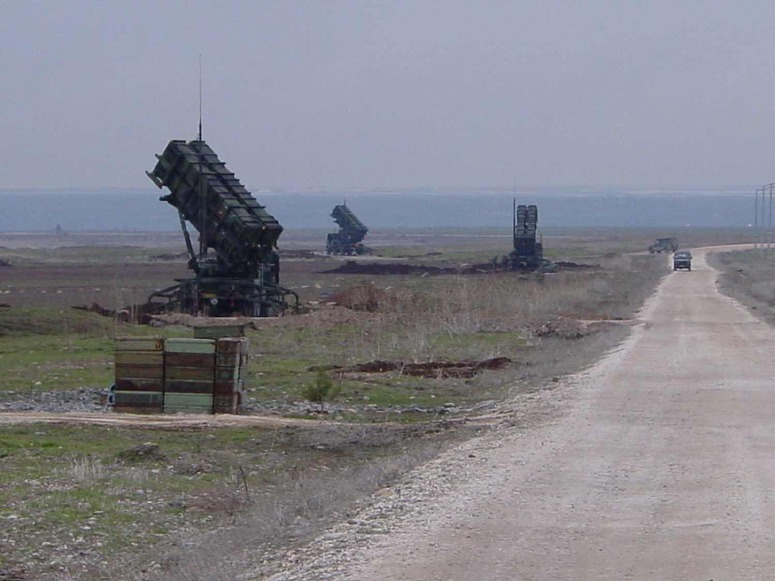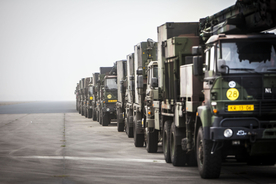NATO support to Turkey : Background and timeline
- English
- French
The Turkish Government has requested that NATO augment Turkey’s air defence capabilities to defend the population and territory of Turkey. On 4 December 2012, NATO Foreign Ministers agreed to this request.

The decision follows discussions held by the Alliance under Article 4 of the NATO Treaty which allows any Ally to call for consultations if the security of any of them is threatened.
The discussions were largely prompted by two incidents earlier in 2012, namely the shooting down of a Turkish jet by Syrian forces in June and the killing of five Turkish civilians in Turkey by Syrian shelling in October.
This is not the first time that NATO has provided such visible support to Turkey. Similar transfer of Patriot missile batteries were made to the country in both 1991 and 2003.
Three NATO Allies have agreed to provide two Patriot missiles batteries each to augment Turkey’s air defences – Germany, the Netherlands and the United States. The locations where the batteries will be deployed were decided jointly with Turkey as the host nation and in close coordination with the Supreme Allied Commander Europe, following a military assessment by the Allies involved and NATO’s Military Authorities. Germany will deploy its batteries to Kahramanmaras, the Netherlands to Adana, and the United States to Gaziantep.
The Alliance’s actions are purely defensive. They show solidarity with an Alliance member with security concerns. These defensive actions aim to contribute to a de-escalation of the crisis along the Alliance’s border.
Timeline of events
June 2012, Ankara
A Turkish F4 reconnaissance jet is shot down by Syrian government forces. The bodies of the two pilots are recovered from the Mediterranean Sea in July.
26 June, Brussels
Following the shooting down of the Turkish jet, Turkey requests that NATO holds consultations (under Article 4 of its Treaty) of the security situation in the region. Following these talks, NATO’s North Atlantic Council states: ‘We consider this act to be unacceptable and condemn it in the strongest terms. It is another example of the Syrian authorities’ disregard for international norms, peace and security, and human life.’
03 October, Akcakale, Turkey
Five civilians - two women and three children - are killed by Syrian shells hitting the Turkish town of Akcakale. Turkey returns fire. Both countries ban each other's planes from their air space.
NATO again holds consultations (under Article 4 of its Treaty) of the security situation in the region following a request from Turkey. Its North Atlantic Council states: ‘In view of the Syrian regime’s recent aggressive acts at NATO’s southeastern border, which are a flagrant breach of international law and a clear and present danger to the security of one of its Allies, the North Atlantic Council met today… and demands the immediate cessation of such aggressive acts against an Ally, and urges the Syrian regime to put an end to flagrant violations of international law.’
21 November, Brussels
The NATO Secretary General states that Turkey has made a request to NATO that the Alliance augment Turkey’s air defence capabilities to defend the population and territory of Turkey, to contribute to the de-escalation of the crisis along NATO’s south-eastern border and to show Alliance solidarity to Turkey.
28 November, Turkey
A NATO team visits Turkey to conduct a site survey, conducted in line with the possible locating of enhanced air defence facilities in the country.
04 December, Brussels
NATO’s North Atlantic Council authorises its Supreme Allied Commander Europe (SACEUR) to liaise with Turkey and nations willing to contribute Patriot air defence systems to implement their purely defensive deployment, in line with NATO’s standing air defence plan.

Dutch Patriot Battery ready to be shipped to Turkey (7 Jan 2013)
21 December 2012, Brussels
NATO announces the decision to site Patriot batteries at Kahramanmaras, Adana and Gaziantep.
4-7 January 2013, Germany / Netherlands / Turkey / US
Advance contingents of Dutch, German and US personnel arrive in Turkey. Transport of equipment from Germany, the Netherlands and the US begins by sea and air.
20-21 January 2013, Incirlik Air Base, Turkey
Arrival by plane of the Dutch and German main contingents at Incirlik Air Base.
21-22 January 2013, Iskenderun, Turkey
Arrival of the Dutch and German ships carrying the bulk of the equipment at the port of Iskenderun.
26 January 2013, Adana, Turkey
The first Patriot battery, provided by the Netherlands, is declared operational and placed under the command and control of NATO.
28 January 2013, Kahramanmaras, Turkey
The Patriot batteries provided by Germany are declared operational and placed under the command and control of NATO.
5 February 2013, Gaziantep, Turkey
The first Patriot battery provided by the United States is declared operational and placed under the command and control of NATO.
15 February 2013, Gaziantep, Turkey
The final of six Patriot missile batteries deployed to Turkey is declared operational under NATO command and control.
